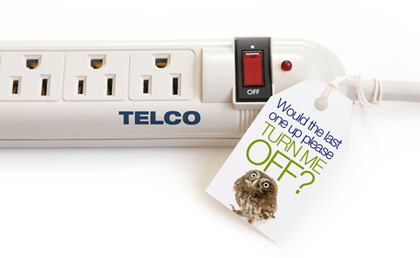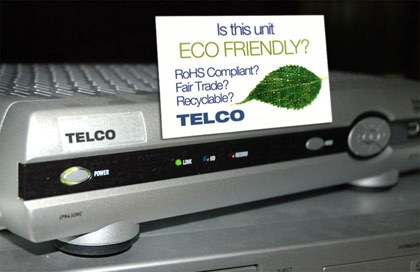This fall, our family got Digital TV from our local service provider. I’ll call them ‘Telco’ - those of you south of the border, feel free to substitute your local Comcast-like corporation. The promo deal sucked us in, our friendly installer managed to figure out how to wire both ends of a 1920’s apartment without stapling cable everywhere and now we can vegetate digitally. (Of course, the first thing I did with this marvel of new technology was use the PVR to record a Space Channel marathon of 30-year-old Star Trek episodes.)
But even as the system was being assembled in our home, I wondered about its footprint. In order to decode and deliver the signals for digital TV and broadband Internet, we took delivery of: two set top boxes, a PVR, a wireless router, a network router and a switcher.
I wondered, how much power do they use? Are all the electronics compliant with RoHS? (the Restriction of Hazardous Substances Directive or RoHS adopted in 2003 by the EU that restricts the use of hazardous materials in electronics) What happens to these units when they needs to be replaced? And what happens to the leftover boxes, plastic and Styrofoam after installation?
As I found out from their most recent CSR Report, ‘Telco’ does recycle e-waste – more than 500 metric tonnes in 2008. They also re-use a lot of equipment, donating over 8,000 computers through the Computers for Schools program. And with an ongoing relationship with a Canadian Tree-Planting NGO, they also pledged to plant a tree for every piece of wireless equipment recycled, and exceeded their goals, starting over 170,000 seedlings. All good green info which a lot of TV customers would probably like to hear.
But with their distribution of digital TV gear, there is a supply chain opportunity as well. Several years ago, Wal-Mart single-handedly changed the detergent business when they refused to stock anything other than concentrated formula. And though not on the same planetary scale, I imagine ‘Telco’ must be a large consumer of routers, switchers and the like. Could they ask for stronger standards? Work with suppliers like SMC and Scientific Atlanta to improve packaging and recyclability? After all, the ’Telco’ logo is on this equipment, too.
But they don’t have to go to such lengths to make a visible and real difference. There is one simple piece of equipment they could add to the TV installation process that would save energy, and help customers think a little more about conservation.
A simple power bar would only cost about 5 bucks, and would really help to make this future just a little friendlier.


